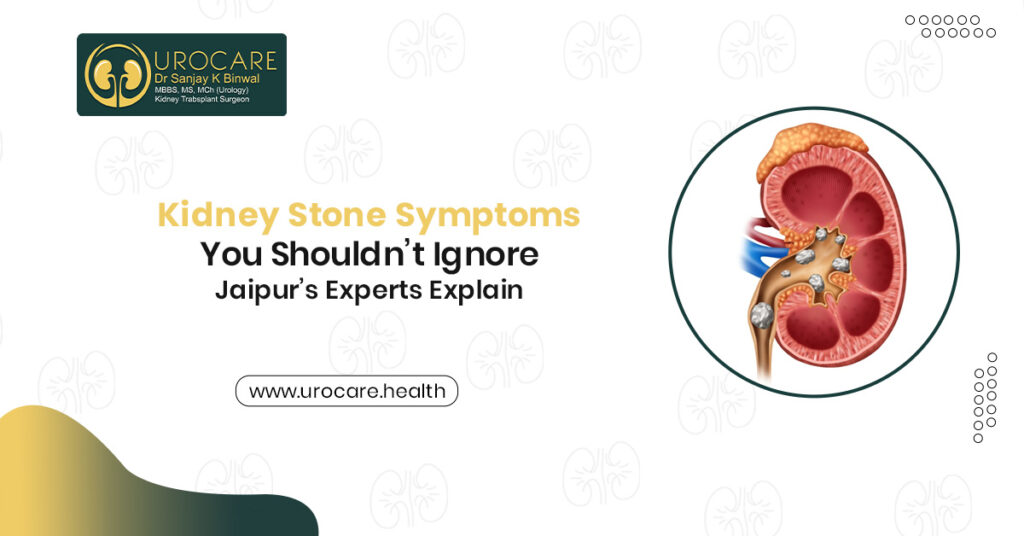
Kidney Stone Symptoms You Shouldn’t Ignore
Kidney stones are a common urological condition that can affect individuals of any age. What begins as mild discomfort can quickly escalate into severe pain and complications if left untreated. Many patients tend to overlook early symptoms, assuming they’re minor issues. However, timely diagnosis and treatment can save you from significant discomfort and long-term kidney damage.
In Jaipur, Dr. Sanjay K Binwal, a highly experienced urologist in Jaipur, emphasizes the importance of early intervention. With over 13 years of clinical experience, he specializes in advanced treatments such as Laser Surgery and RIRS (Retrograde Intrarenal Surgery) for managing kidney stones with precision and minimal discomfort.
What Are Kidney Stones?
Kidney stones are hard deposits made of minerals and salts that form inside your kidneys. They can vary in size—from a grain of sand to the size of a golf ball—and may pass unnoticed or cause excruciating pain when moving through the urinary tract.
Without prompt Kidney Stone Treatment in Jaipur, stones can lead to infections, kidney damage, or repeated episodes of urinary issues.
Kidney Stone Symptoms You Shouldn’t Ignore
1. Severe Pain in the Lower Back or Side
One of the most common signs is sharp, stabbing pain in the lower back, side, or abdomen. The pain can come in waves and vary in intensity. This typically occurs when a stone moves into the ureter, blocking urine flow.
Tip: If the pain is sudden and doesn’t improve with rest, consult a urologist immediately.
2. Blood in Urine (Hematuria)
Blood in the urine can appear pink, red, or brown. This symptom suggests that a stone is irritating the urinary tract lining. Even if it’s painless, blood in urine should never be ignored.
3. Burning Sensation While Urinating
A kidney stone lodged near the bladder can cause pain or a burning feeling during urination, often mistaken for a urinary tract infection (UTI).
4. Frequent Urge to Urinate
Feeling the need to urinate more frequently, especially in small amounts, is another red flag. This occurs when a stone moves to the lower part of the urinary tract.
5. Cloudy or Foul-Smelling Urine
Changes in the smell or appearance of urine may signal infection or concentrated mineral buildup. It’s important to monitor these changes, particularly when accompanied by other symptoms.
6. Nausea and Vomiting
Kidney stones can irritate nerves that connect the kidneys to the gastrointestinal tract, leading to nausea or vomiting, particularly during painful episodes.
7. Fever and Chills
These are warning signs of a potential infection in the kidneys or urinary tract. Immediate medical attention is essential if these symptoms are present alongside urinary issues.
Meet Dr. Sanjay K Binwal – Jaipur’s Trusted Urologist
When it comes to diagnosing and treating kidney stones, experience and expertise matter. Dr. Sanjay K Binwal is a renowned urologist in Jaipur, offering compassionate and precise care. His areas of expertise include:
- Kidney Stone Treatment in Jaipur using minimally invasive techniques
- Laser Surgery for stone fragmentation
- RIRS (Retrograde Intrarenal Surgery) for complex and upper tract stones
- Management of chronic kidney diseases and urinary disorders
With a patient-first approach, Dr. Binwal ensures minimal discomfort, faster recovery, and long-term results.
Modern Treatment Options: Laser & RIRS
Thanks to technological advancements, kidney stone treatments are now more effective and less painful.
Laser Surgery
This involves using high-powered laser beams to break down stones into fine particles, which can then be passed naturally. It’s safe, fast, and highly efficient.
RIRS (Retrograde Intrarenal Surgery)
A highly advanced and minimally invasive procedure where a flexible ureteroscope is passed through the urinary tract to access and remove stones without cuts or stitches. It’s ideal for stones located deep in the kidney or ureter.
Benefits:
- Minimal blood loss
- Quick recovery time
- No external incision
- High success rate
Hydration Tips to Prevent Kidney Stones
Prevention begins with hydration. Drinking 2–3 liters of water daily helps flush out excess minerals and prevents stone formation.
Additional Tips:
- Limit salt and oxalate-rich foods (like spinach, nuts)
- Consume calcium-rich foods (they bind oxalates)
- Avoid excessive animal protein and sugary drinks
Conclusion
Kidney stones can be a painful and persistent problem, but they don’t have to be. By understanding the warning signs and acting early, you can prevent complications and recover with minimal discomfort. With expert care from Dr. Sanjay K Binwal, modern treatments like Laser Surgery and RIRS, and a commitment to your well-being, you’re in safe hands.




